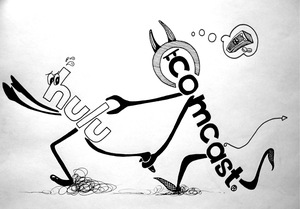Will people pay for what was free?
Every Thursday afternoon, I return home from a mentally taxing hour-plus of political philosophy (Marx, anyone?), cozy up in my bed with my laptop, click on my bookmarked link to Hulu and watch the most recent episode of Glee. With this routine, I can get through even the darkest of weeks. Glee, no doubt the greatest thing on TV in recent memory, is the light at the end of my proverbial tunnel.
You might, then, be able to imagine my reaction when I read in Monday’s Los Angeles Times this headline: “Will Hulu make you pay to watch?”
If you guessed heartache (or some such variation thereof, like heartbreaking sadness or heartfelt pain), you’d be right. I needed a Kleenex — or eight — to dry my face.
Since I have class Wednesday nights, I can never watch Glee on TV. Hulu, despite its buffering and occasional choppiness at inopportune moments, is the next best thing. The thought of having it taken away from me or at least of being charged for its use, especially when I’ve already incurred Netflix and several magazine subscription costs, is, well, unbearable.
Essentially, if Comcast Corporation, the cable giant openly opposed to Hulu’s distribution of free TV content, ends up merging with NBC Universal, Hulu — of which NBC owns a substantial part, along with Fox Broadcasting and Walt Disney Co. — may no longer be free.
The argument from Comcast and others, including Wall Street investors, is that people will slowly stop subscribing to pay-TV services and watch their favorite cable shows exclusively online, effectively killing off the cable industry.
Of course, this isn’t a realistic fear, but merely another example of blaming the Internet for all earthly woes. If I were home, I would watch Glee on TV. Nobody elects to watch shows online if they don’t have to. The screen is generally smaller, the loading time inconvenient, the commercials unexciting or even disturbing (no more advertisements for female arousal gels, please), the choppiness maddening and the poor sound and image quality — compared to, say, high-definition TV — very unfortunate.
Even if time and technological advances eliminate some of these shortcomings, TV will always be one step ahead.
Plus, if cable companies were eventually bankrupted by Hulu and the like, then the shows themselves would cease to be, and we would have no need of Hulu. Clearly, Comcast is mistaken — or simply money-grubbing.
Right?
It’s easy, at first, to give bad press to the notion of pay models for websites. The Internet was originally born free, and we now take free online content as a given. If we can’t find some video online, or even the text of a popular book, we get angry. How is it, we ask, that no one has posted this online? Screw copyright; this is the Internet!
But ultimately, we can’t screw copyright. People have rights to their intellectual property, and it isn’t avarice, per se, that is animating corporate leaders to propose new pay models. If certain businesses are to survive, revenue must come in, and right now online advertisements aren’t nearly enough. Consider the newspaper, seemingly fated to fade out of existence as the Internet takes over. In all likelihood, newspapers will not completely die out, but for them to survive — and survive they must — online pay models will probably have to be implemented.
I read the New York Times every day and don’t pay a cent. A part of me thinks I should be able to, but another part of me — an increasingly larger part — thinks I shouldn’t. We should pay for the services we use. The mistake of the Internet was that it started out free — a privilege that must eventually, if such things as newspapers and cable TV and even music are to survive and flourish, be taken away.
What of Glee, my favorite show? It isn’t the only show I watch on Hulu, actually (bring back Firefly!). Despite my initial shock at even considering paying for free access, I now believe I would be comfortable paying a small premium to use the website. Cable charges exorbitant fees anyway; if Hulu’s premium were comparable to, say, Netflix’s (maybe a little less), I would certainly consider paying it — especially if it meant an end to commercials and guaranteed high image and sound quality. I think the compromise is a good one: no commercials for your favorite shows, but a monthly charge. Think TiVo, except anywhere.
The process of monetizing the Internet will inevitably be a slow one. We must be weaned off our sense of entitlement, and that will take time.
Especially for people who thinks they’re entitled to everything.
Jason Kehe is a sophomore majoring in print journalism. His column, “Small Wonder,” runs every other Wednesday.

